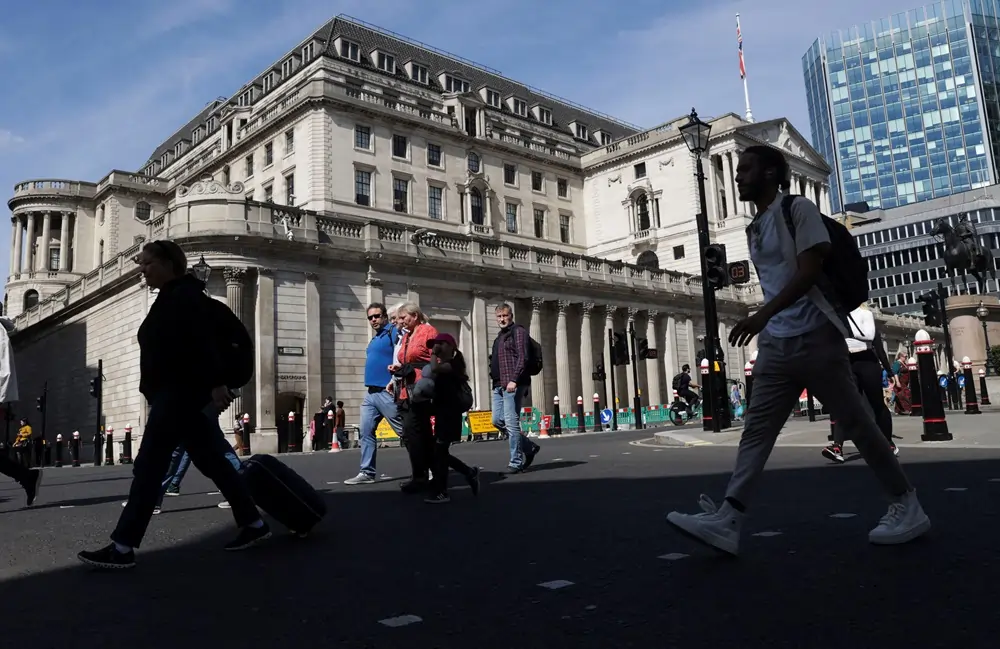
By Naomi Rovnick and Yoruk Bahceli
LONDON (Reuters) – Traders upped bets for a Bank of England rate cut in August, helping to underpin a pre-election rally for UK stocks and government bonds even though the central bank left rates on hold at a 16-year high on Thursday.
After the BoE delivered its widely expected decision it hinted that it was edging closer to cuts, prompting money markets to place a 44% probability on a move in August, up from around 32% a day earlier. They priced in a 90% chance of a September cut.
Wednesday’s data showing UK inflation has dropped to the BoE’s 2% target have encouraged those bets.
Investors now widely see rate cuts boosting the UK economy alongside a predicted landslide in the July 4 general election for the opposition Labour Party, which claims it can rebuild growth and run the country’s debt-laden finances cautiously.
That’s a turnaround for UK markets scarred by the 2016 Brexit vote and former Conservative Prime Minister Liz Truss’ under-funded 2022 mini-Budget.
“Rate cuts are definitely coming and we have a stable outlook for government for the next few years,” Morningstar European strategist Michael Field said.
James Briggs, a portfolio manager at Janus Henderson, said he had a “relatively upbeat” stance towards UK stocks, corporate credit and government bonds, known as gilts.
He said UK equity and credit valuations did not yet reflect the economy’s improving prospects and that gilts would benefit because “that tail risk of unorthodox fiscal policy is off the table.”
RALLY ON?
London’s FTSE 100 share index was steady just below record highs hit in May on Thursday. Sterling slipped 0.2% to around 84.58 percent per euro, but held near its strongest levels since 2022.
Two-year gilt yields dropped to their lowest since March after the BoE’s decision, LSEG data showed.
UK bonds, which have outperformed U.S. and euro zone government bonds this month, rallied as the BoE said that the outlook for rate cuts was “finely balanced.”
Pictet Asset Management senior economist Nikolay Markov was negative on gilts because he suspected Labour, which has a long held image as a tax-and-spend party, might prioritise public spending over keeping state borrowing under control.
“The public finances are not in good shape,” Markov said, adding that potential moves by Labour to stimulate the economy would be inflationary.
Economists polled by Reuters expect the UK economy to grow by 0.7% this year, in an upgrade to earlier forecasts that had placed Britain at the bottom of the league table for predicted growth among advanced economies in 2024.
Becky Qin, multi-asset portfolio manager at Fidelity International, said she would keep a neutral stance on UK stocks until she saw further signs of sustainable economic growth.
“Inflation data is also not as good as the BoE probably hoped for,” she said, referencing UK services sector inflation that stayed stubbornly high at 5.7% in May.
CAUTION
While UK markets are rallying, there are few signs as yet that they are picking up long-term support.
Tracker funds that offer low-cost exposure to UK equity indices have pulled in new money during three of the last four weeks since Prime Minister Rishi Sunak called the election, data from Lipper Global shows.
Actively managed UK stock funds, which are a longer term commitment because they charge higher fees and promise superior returns over time, have suffered outflows in recent weeks in a trend that has persisted for years.
Janus’ Briggs said a recent spate of takeovers of UK-listed companies could prompt investors to question if they were missing out on bargain valuations.
Overall, the mood among investors towards the UK was buoyant as rate cut hopes added to the pre-election buzz.
Yvan Mamalet, senior market strategist at SG Kleinwort Hambros, said his firm was bullish on UK stocks and gilts, although he expected rate cuts to pressure sterling.
And Newton Investment Management fixed income portfolio manager Carl Shepherd said he favoured long-term gilts.
“There are idiosyncratic risks in the UK and there is that sticky services inflation, but I think (once we) get the election out of the way, there’d be hopefully a period of more stability.”
(Reporting by Naomi Rovnick and Yoruk Bahceli; editing by Dhara Ranasinghe and Jane Merriman)


